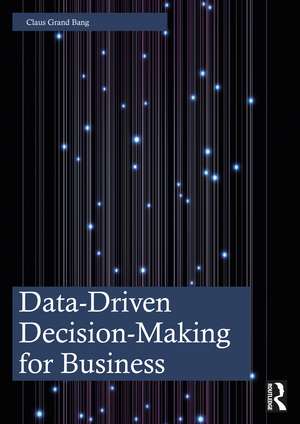Data-Driven Decision-Making for Business
Autor Claus Grand Bangen Limba Engleză Paperback – 22 aug 2024
Throughout the book, the reader will examine how to convert data to value through data-driven decision-making, as well as how to create a strong foundation for such decision-making within organizations. Covering topics such as strategy, culture, analysis, and ethics, the text uses a collection of diverse and up-to-date case studies to convey insights which can be developed into future action. Simultaneously, the text works to bridge the gap between data specialists and businesspeople. Clear learning outcomes and chapter summaries ensure that key points are highlighted, enabling lecturers to easily align the text to their curriculums.
Data-Driven Decision-Making for Business provides important reading for undergraduate and postgraduate students of business and data analytics programs, as well as wider MBA classes. Chapters can also be used on a standalone basis, turning the book into a key reference work for students graduating into practitioners. The book is supported by online resources, including PowerPoint slides for each chapter.
| Toate formatele și edițiile | Preț | Express |
|---|---|---|
| Paperback (1) | 334.95 lei 3-5 săpt. | +26.00 lei 7-13 zile |
| Taylor & Francis – 22 aug 2024 | 334.95 lei 3-5 săpt. | +26.00 lei 7-13 zile |
| Hardback (1) | 1009.60 lei 6-8 săpt. | |
| Taylor & Francis – 22 aug 2024 | 1009.60 lei 6-8 săpt. |
Preț: 334.95 lei
Nou
Puncte Express: 502
Preț estimativ în valută:
64.09€ • 69.84$ • 54.01£
64.09€ • 69.84$ • 54.01£
Carte disponibilă
Livrare economică 02-16 aprilie
Livrare express 19-25 martie pentru 35.99 lei
Preluare comenzi: 021 569.72.76
Specificații
ISBN-13: 9781032601496
ISBN-10: 1032601493
Pagini: 326
Ilustrații: 74
Dimensiuni: 174 x 246 x 23 mm
Greutate: 0.54 kg
Ediția:1
Editura: Taylor & Francis
Colecția Routledge
Locul publicării:Oxford, United Kingdom
ISBN-10: 1032601493
Pagini: 326
Ilustrații: 74
Dimensiuni: 174 x 246 x 23 mm
Greutate: 0.54 kg
Ediția:1
Editura: Taylor & Francis
Colecția Routledge
Locul publicării:Oxford, United Kingdom
Public țintă
Postgraduate and Undergraduate AdvancedCuprins
1. Introduction: What is Data-Driven Decision Making and Why Does It Matter? 2. Data Strategy: How to Align Data Initiatives with Business Goals and Objectives 3. Data Products 4. Data Culture: How to Foster a Data-Driven Mindset (data literacy) and Behaviour 5. Data Sources: How to Find, Collect, and Manage Data for Business Value 6. Data Visualization and Presentation 7. Data Analysis: Understand How Descriptive, Predictive, and Prescriptive Analytics can suppport the organizational Decision Processes 8. Data Infrastructure: How to Build and Manage a Modern Data Stack 9. Data Ethics: How to Ensure The Data Practices Are Responsible, Secure, and Legal 10. Perspectives on Decision Making using generative AI
Notă biografică
Claus Grand Bang is Associate Professor at Dania Academy, Denmark. He has more than ten years of business experience developing companies based on data and another ten years in academia teaching students from all over the world. As a lecturer, he has specialized in the fields of applied data analysis, supply chain management, and project management. He created one of the first applied data analytics degrees in Europe. Now, as Head of Data and IT, at a global biotech company he applies what he has taught in academia.
Descriere
In this book, the reader will discover the history, theory and practice of data-driven decision-making, learning how organisations and individual managers alike can utilise its methods to avoid cognitive biases and improve confidence in their decisions. It argues that value does not come from data, but from acting on data.
